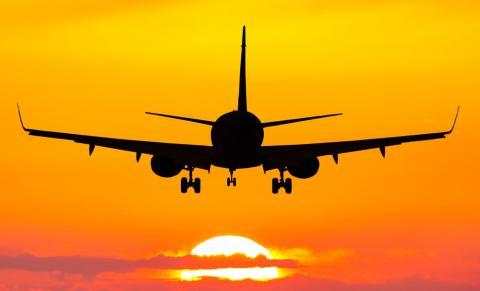
Having a fear of flying isn’t fun. I can tell you this firsthand as it’s something I’ve struggled with for the past 12 years. I don’t know exactly when or why I started to panic during takeoff or turbulence, my hands gripping the armrests, my palms sweaty. There have been times when my anxiety around flying was so high that I’ve failed to get on flights, and times when I’ve made excuses not to travel—and I love little more than traveling—if it meant having to get on a plane. Don’t get me started on the weeks leading up to the flight, either: nightmares of plane crashes and awful turbulence dotted my dreams and I’d wake up sweat-soaked and dreading our departure date.
Friends and family with good intentions have suggested that I have a few drinks to calm my nerves, or look into medication for anxiety. I don’t drink in daily life and prefer to try more holistic options at first (although I am fully aware of the stigma around medication and if you need medication, that’s a different story.) So, in an attempt to calm my nerves, I did my research, tried out several different strategies, and came up with this: my 5 holistic tips to face your fear of flying.
1. Knowledge
Ignorance is bliss, they say, but I’m not so sure that’s true when it comes to flying. Not knowing why turbulence occurs or how planes are built to withstand high amounts of turbulence—far more than we’ll ever feel on a flight—can be scary, especially if we start to replace our lack of understanding with what our brains are trying to make us believe: Engine failure! Fire! The plane is going down!
Rather than give in to anxiety-produced ideas, it can be helpful to speak with people who travel on planes the most: flight attendants and pilots. Seek out information from them, and don’t feel embarrassed about telling them about your fear of flying. You’d be surprised how reassured you might feel when you see professionals carry out their jobs as though flying isn’t a big deal—because to them, it isn’t.
2. Aromatherapy
TSA probably won’t allow you to bring your entire collection of essential oils in your carry-on bag, but even a small glass jar of your favorite oil (no more than 2 oz. and placed in a ziploc bag) can have a calming effect. A 2013 study concluded that odor can have a strong effect on emotions, with implications to treat people with depression; a more focused study found that aromatherapy massage reduced anxiety in patients with malignant brain tumors, but this suggests an effect on people regardless of a disease.
I have a particular fondness for lavender, and like to place a few drops on a scarf or on the back of my wrist to smell when I’m feeling tense. Fortunately, this works well to cover up any unpleasant smells from fellow passengers or last-minute airport-purchased meals with far too much onion or garlic. The essential oil you choose is up to you but look for one that has grounding effects. I like ylang ylang, rose, and frankincense.
3. Tea & Snacks
Most of the time, snacking while stressed isn’t a good thing, but I take exception to this rule when flying. For one, certain foods can be calming. Try nuts, fair-trade dark chocolate, or antioxidant rich fruit, or make your own trail mix. Secondly, eating can often work as a form of distraction. On very long flights, I’ll often bring my own meals in tiffins or glassware and enjoy it as I peruse an in-flight magazine.
Tea is another great option. Most flights don’t offer much more than a standard black tea, so I like to bring along a few favorites. These include chamomile, holy basil, and ginger for digestion. Simply ask for a cup of hot water and enjoy.
4. Therapy
Therapy has been especially helpful for me over the last few years, and it’s taken a few different forms. I’ve worked one-on-one with a therapist, spoken with a commercial pilot who doubles as a counselor, and even gone through a year of hypnotherapy. To this day I travel with the hypnosis tapes my hypnotherapist gave me as a backup if I’m feeling especially anxious during my flight. These sessions are similar to meditation or visualization: some focus simply on breathing, while others encourage the listener to imagine a smooth flight, relaxed muscles, and an overall feeling of joy. If you don’t know where to start, begin with meeting a credited therapist near you.
While there is some controversy surrounding emotional support animals, this can be a fantastic option for some. Ensure that you abide by the current guidelines by certifying your dog through a credited training program.
5. Music
I rely on music every time I fly, and choosing music that I look forward to listening to on flights is incredibly helpful. I prefer lighthearted or uplifting music; because of my tastes, this usually means acoustic folk, but choose songs with positive themes that you enjoy. I find music to be particularly helpful during takeoff, landing, and turbulence, when my stress levels tend to be at their highest. A 2002 study looked at patients undergoing surgery: those who listened to their 30-minute planned playlist before surgery had far lower anxiety levels than those who did not listen to music of any kind.
My fear of flying isn’t gone, and I’m not sure it ever will be. But because traveling and visiting family is important to me, I’m willing to do whatever I can to deal with my anxiety in a way that allows me to maximize my life. This decision, however, is up to the individual.
It’s important to note that this isn’t an exhaustive list. If you feel that these holistic options don’t work, you may be a good candidate for medication. This is something that should be discussed with your healthcare practitioner.








